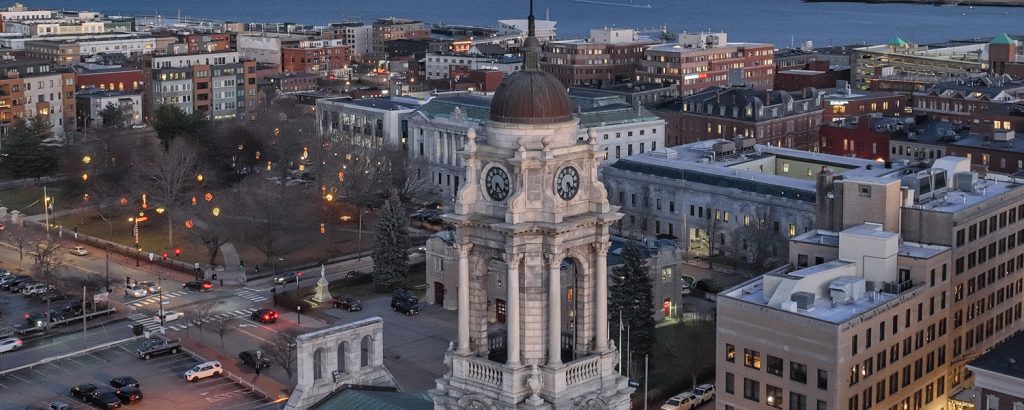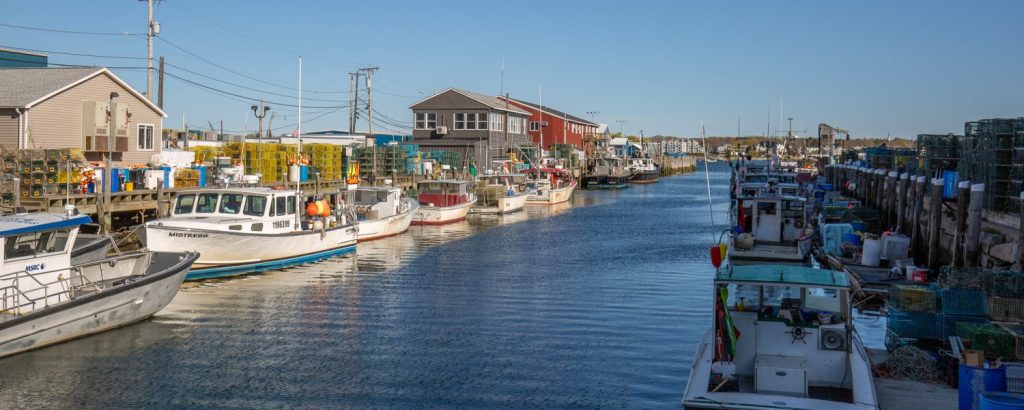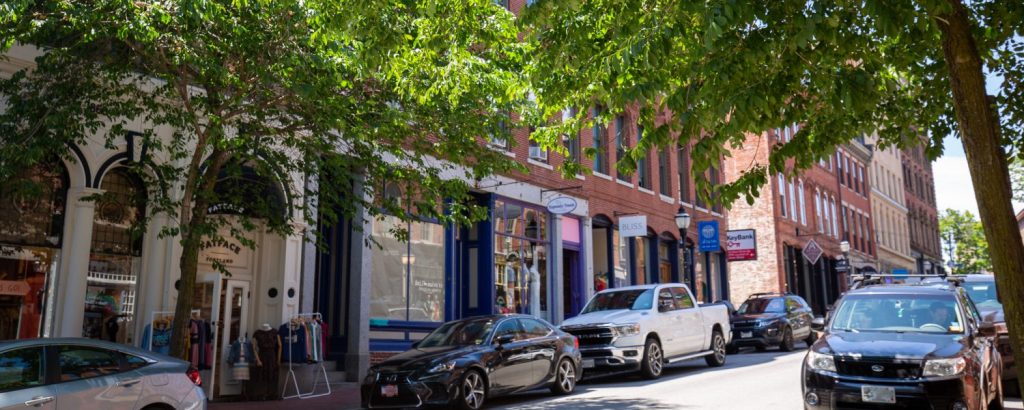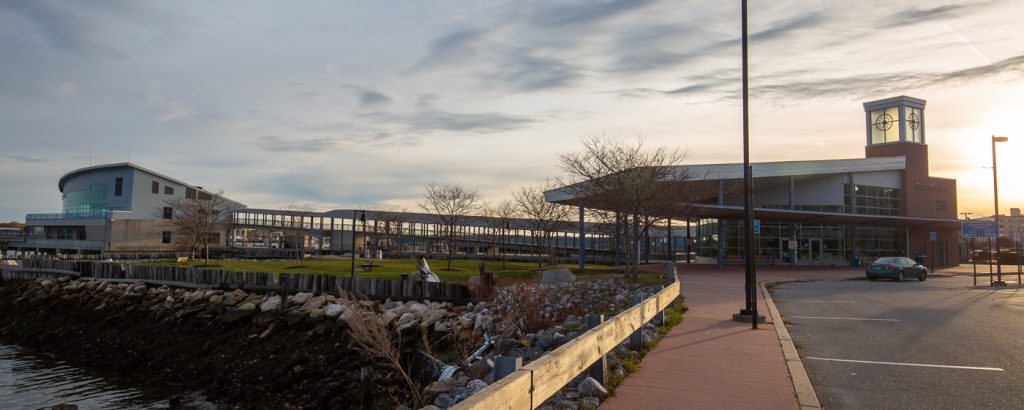Early History of THE CVB
Visit Portland was formed on October 21, 1982, as the Convention & Visitors Bureau of Greater Portland. Forty years later, we are still going strong in marketing the Greater Portland region to visitors, meeting planners, tour operators, wedding couples, media, and more. Here is the story of how we came to be…
WHEN OPPORTUNITY KNOCKS
Since 1965 hoteliers had operated a Convention & Visitors Bureau (CVB) in corporation with the Chamber. Over the years, a staff person was added to service incoming conventions and often hoteliers would assess themselves a dollar a room to help bring in large city-wide conventions. In the mid-70’s the hotels chose to dedicate a portion of their Chamber dues specifically to the CVB and they began fundraising. This may have prepared the hoteliers, more than they realized, to seize the opportunity that would arise a few years later.
It was late winter of 1982 when the Chamber of Commerce laid out its plan to discontinue operation of a Convention Bureau in Portland. Some may have seen this as a door closing, but local hoteliers saw it as an opportunity.
“We had a goal. There were conventions on the books and those people had to be assured that they’d be taken care of.” said Gustave Tillman, then Director of Operations Holiday Inn by the Bay

In March of 1982, after a series of meetings between the Chamber President, Jack MacDairmid, and Gustave Tillman, the hoteliers decided that they would assume full operation of the CVB. There were a number of conventions booked, including the National Governor’s Association Conference. Enough to turn even the biggest skeptic’s head, and for the first time people stood up and took notice that Greater Portland was an attractive and underestimated conference destination. It lit a fire under the hoteliers.
Feeling like there was no other choice, a group of hoteliers formed a core group to provide leadership to the CVB and discuss fundraising.
Gustave Tillman, Holiday Inn – Downtown (now Holiday Inn by the Bay)
Kenny Lefebvre, Holiday Inn West (now Fireside Inn & Suites)
Tim Severence, The Eastland Hotel (now the Westin Portland Harborview)
Jess Storey, Best Western Executive Inn (now the Best Western Merry Manor)
Don DuPaul, Sheraton Inn (now the DoubleTree Hotel)
Norm Dugas, Black Point Inn
Donald Haggett, Ramada Inn & Conference Center (now the Clarion Hotel)
From the very beginning there was a sense of being “in this together.” Maybe it was because there were so few of them, but they always approached everything they did as a tight-knit group.
“Gus was the one who got on the phone, called the meetings, realized the importance of the Bureau, and pushed hard for its continuation and its growth, If it weren’t for his energies and consistent support, I don’t think there would be a CVB today.” Says Donald Haggett, then Director of Sales, Marketing, & Operations at the Ramada Inn & Conference Center.
SHAKEY BEGINNINGS

In March of 1982, Trudy McNulty became the first Executive Director. With no office space and a budget of $16,000, the Convention and Visitors Bureau of Greater Portland became a reality, albeit a shaky one.
“We had our share of ups and downs, early on. In 1983 we had just 30 members and we operated on a shoestring. I’m sure Trudy went to bed many a night, wondering if she’d wake up to a job the next day.” Gustave Tillman
In October of 1983, Trudy’s job nearly did dissolve. The CVB faced a $27,000 deficit and the majority of the members had decided to discontinue the Bureau. After a long protracted meeting, they changed their minds and decided, instead, to double their dues to continue the effort. They put their money where their convictions were, and with that one stroke, they showed unprecedented faith in Portland and all she could be.
“Here we were, trying to operate on a shoestring that was fraying at the ends and in the middle, and the last thing anyone would have thought was giving up.” Don DuPaul, then Sheraton Inn
“I would say, that the emphasis in our first three years, aside from providing the service—which was a given, was to establish the CVB as an organization that had a future and that could survive. We were consumed with survival issues and there were a number of things that happened that were make it or break it points for us and somehow, we always made it.” Trudy McNulty, then Executive Director.
During 1985/1986, the organization had exhausted every funding avenue and had a decision to make. From a list of possible revenue generating projects, only one of the options was viable. The organization took a calculated risk and got into the BINGO business.
“The choice was simple—do nothing and go out of business in three months or try Bingo and, if it failed we’d go out of business in a few weeks. We gave Bingo a shot and we were profitable in the first six weeks.” Trudy McNulty
The success gave the Board and Trudy an entrepreneurial approach to managing the Bureau. Following, there were several pivotal points for the organization. The members’ doubling their dues was the first. Other significant changes included expanding the board to a cross section of community leaders, broadening the membership, and securing a $65,000 grant from the City of Portland.
MARKETING BECAME THE FOCUS

With funding stabilized, marketing became the focus. Barbara Whitten joined the CVB in the Spring of 1987. As Director of Development and Marketing, she was responsible for helping the Bureau raise private dollars which would enable the Bureau to secure the matching city grant.
“We had been dependent on a small circle of loyal members for several years. Raising that kind of money really meant we had to broaden out quickly. This forced us to examine ourselves and put a plan together that would attract appropriate members. In that kind of process, you can’t help but discover a great deal about who you are and who you want to be.” Barbara Whitten
Between 1987 and 1991, following the city grant and an increase in membership, the first Visitor’s Guide was produced. In 1989, the opportunity to operate a Visitor Information Center on Free Street presented some initial financial challenges. But by taking it on, they knew they would be able to attract more members and project a new, broader image for the CVB.
“The opportunity to produce the Visitors Guide opened up a whole new awareness in the community. It suddenly became clear that we served the visitor market as well as the convention industry. That was an important turning point for us.” Barbara Whitten
In September of 1990, Barbara was named interim Director after Trudy’s departure. In May of 1991, she officially became the Bureau’s second Executive Director.
On January 22, 1992, the CVB opened its new offices and its new Visitor Information Center at 305 Commercial Street. The City erected signs that clearly pointed the way to the Center. A large sign hung proudly off the front of the building and literally hundreds of visitors passed through the doors daily where they were greeted by one of the 30 dedicated volunteers.
The CVB’s footprint was getting bigger and they were gaining the support they needed beyond anyone’s expectations.
A DECADE LATER

The story content provided is from the organization’s 10 year Annual Meeting. Mentioned in the program is the growth of the organization from 27 members to nearly 400! The CVB became the referral hub for the State of Maine, attracting attention from meeting planners, travel writers, and visitors alike.
The CVB’s history gives us a glimpse into an organization that’s proud of its accomplishments—despite the odds.